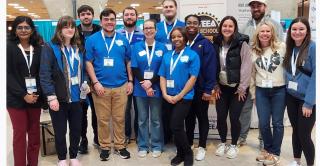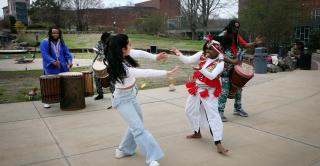
Central to Exploring the Planet.
Central’s BS in Earth Sciences prepares students for careers in the earth and space sciences, including private industry, government, and science education. The BSEd program, designed by our science education faculty, prepares students to teach earth science at the secondary education level.
Programs all have a common core of foundational introductory courses with five specialization options with varied upper-level elective courses selected to develop skills relevant to diverse career paths within the earth and space sciences. Central also offers minors in Astrobiology, Astronomy, Earth Science, and Geology.
Program Features
- Flexible programs allow students to select options from broad array of elective courses and minors that best match their career objectives
- Coursework includes hands-on experience with current techniques, both in the field and in the lab, including multiple opportunities to develop skills with instrumentation and digital technologies commonly used in industry
- Students encouraged to complete independent research projects while working one-on-one with a faculty advisor, and to present their results at a regional or national professional conference
- Active student community and accessible faculty provide a supportive and inclusive learning environment
- Campus location provides easy access to a diversity of locales of geologic interest, and opportunities for a wide variety of student field trips
- Multiple networking opportunities through events with local professional organizations such as the Geological Society of Connecticut and the Environmental Professionals of Connecticut
- Financial aid and scholarships available
- Free on-campus child care
Program Options
The Environmental Geology Specialization is designed for students planning a career as a professional geologist with government agencies (e.g. environmental protection), and environmental industries. In addition, students will be prepared for graduate-level studies in geology or related fields.
The Geology Specialization is designed for students planning a career as a professional geologist with government agencies (e.g. geological surveys), and geotechnical, mining, and energy industries. In addition, students will be prepared for graduate-level studies in geology or related fields.
The Planetary Geology Specialization is designed for students planning a career as a professional geologist with government agencies (e.g. NASA) or the remote sensing industry.
The Environmental Earth Science Specialization is designed for students who want to study geological sciences with an environmental focus but who are not intending to work as professional geologists. This Specialization is appropriate for students planning a career in public policy relating to environmental issues, environmental education, resource management, business (environmental consulting), environmental hazards, environmental law, or environmental medicine.
The General Earth Science Specialization is designed for students who want to study geological sciences, but who are not intending to work as professional geologists. This Specialization is appropriate for students planning a career in public policy relating to earth science issues, earth-science education, resource management, museum/observatory management, science journalism, library science, technical writing, or business.



